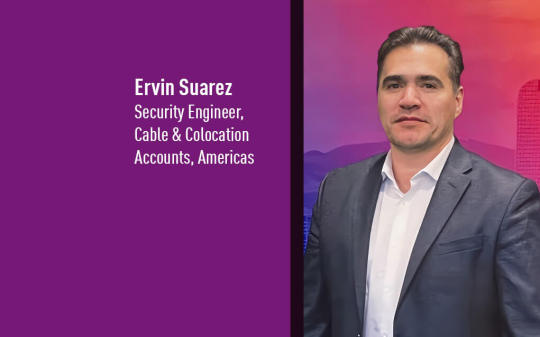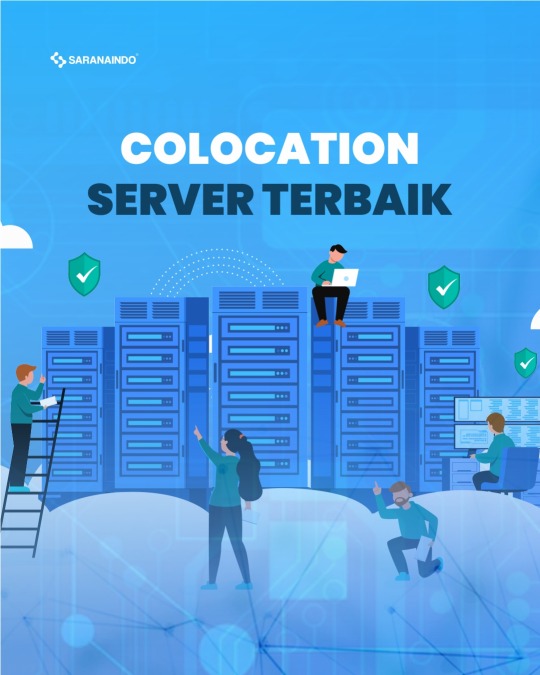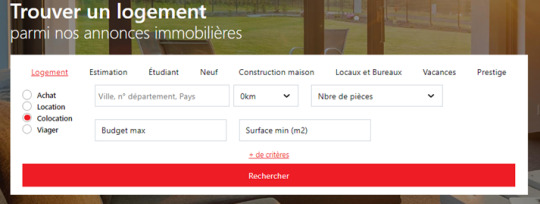#Colocation
Text

Selamat Tahun Baru Imlek! Selamat dan Sejahtera untuk kita semua di Tahun Baru Imlek 2023.
#imlek#imlek2023#chinese#imlekday#rumah#saranaindo#server#VPS#VPSindonesia#cloudhosting#cloud#colocationindonesia#colocation#webhosting#domain
2 notes
·
View notes
Text
J’essaye toujours vainement de trouver une coloc à Paris. J’y arrive toujours pas xD Je comprends pas trop pourquoi. La dernière fois, j’avais 28 ans, je suis passée de l’autre côté des 30 depuis, est-ce pour ça ?
3 notes
·
View notes
Text
Why enterprises are going hybrid and returning to colo! - CyberTalk
New Post has been published on https://thedigitalinsider.com/why-enterprises-are-going-hybrid-and-returning-to-colo-cybertalk/
Why enterprises are going hybrid and returning to colo! - CyberTalk


By Ervin Suarez, Security Engineer for Cable and Colocation Accounts, Check Point Software Technologies.
I’ve been closely observing a fascinating shift in the IT landscape and wanted to share some insights with all of you, especially given how these changes could impact our industry.
Lately, there’s been a noticeable shift among enterprises back towards colocation (colo) services, while they’ve simultaneously embraced hybrid cloud models. This trend is intriguing and speaks volumes about the evolving needs and strategies of businesses when it comes to managing IT infrastructure.
Why the shift, you might ask?
Cost efficiency: The reality is, while cloud services offer unmatched scalability, they can also escalate costs for specific workloads or data-intensive operations. Colocation offers a more predictable expense model, which is especially appealing for operations with stable demand.
Enhanced control and security: With colocation, businesses gain direct control over their physical servers, a non-negotiable for industries under tight regulatory scrutiny. This control translates into superior compliance and security, aligned with stringent industry standards.
Optimized performance: By strategically choosing colo sites, enterprises can drastically reduce latency for critical applications, ensuring high-performance outputs that cloud environments can sometimes struggle to match.
Flexibility and scalability: The hybrid model shines by offering the best of both worlds – colo for critical, stable workloads and cloud services for scalable, flexible needs. This balance is crucial for businesses that aim to maintain agility without compromising on reliability.
Robust business continuity: Distributing resources between colo and cloud environments enhances disaster recovery strategies, leveraging colo’s inherent infrastructure resilience and reliability.
Compliance with data sovereignty: In an era where data privacy reigns supreme, colocation facilities offer a strategic advantage by allowing businesses to physically host data within required jurisdictions, meeting stringent regulatory demands head-on.
What does this mean for us?
The resurgence in colocation interest, alongside a robust adoption of hybrid cloud strategies, indicates a balanced, pragmatic approach to digital infrastructure management. Businesses are seeking to optimize costs without sacrificing control, performance, or compliance.
We’re also seeing increasing collaborations between cloud and colo providers, simplifying the transition to hybrid models for enterprises. This partnership ecosystem paves the way for innovative solutions, making hybrid strategies more accessible and effective.
Innovations in networking and connectivity continue to blur the lines between colo and cloud, enabling more seamless management of distributed IT resources.
As we navigate these changes, it’s clear that flexibility, strategic planning, and an eye for optimization are key to leveraging the best of both colo and cloud worlds. The move towards hybrid infrastructures isn’t just a trend; it’s a strategic realignment of IT resources to better meet the demands of modern business operations.
This shift is supported by several trends and developments in the industry:
1. Resurgence of colocation: Colocation is becoming crucial again as companies become increasingly dependent on robust IT infrastructure to manage the growing volume of data. Traditional colocation provides reliable and secure options for IT infrastructure, which is critical given the rising importance of data privacy and security. Colocation solutions offer businesses a way to protect their data, ensure high availability, and achieve resilience while saving on capital expenditure and operational costs. This is because colocation allows businesses to leverage existing, well-maintained infrastructures which would otherwise require significant upfront investment (Datacenters).
2. Hybrid cloud flexibility: Hybrid cloud models are being recognized for their ability to provide agility and flexibility in the technology stack. This model allows enterprises to not only meet their current technological needs but also prepare for future demands. The hybrid cloud’s capacity to integrate edge computing with cloud architectures enables more businesses to adopt this technology. It effectively lowers latency, reduces bandwidth requirements, and enhances resiliency against network outages. This adoption is visible across various sectors, including telecommunications, retail, manufacturing, and energy, indicating a broad-based validation of the hybrid cloud’s value (The Enterprisers Project).
3. Multi-cloud and vendor-neutral environments: Enterprises are also moving towards a more vendor-neutral approach in their cloud and colocation strategies. This shift is partly due to the need to avoid vendor lock-in, which can limit flexibility and control. The hybrid and multi-cloud architectures, comprised of combinations of public clouds, private clouds, and colocation data centers, allow enterprises to tailor their IT infrastructure to meet specific needs while ensuring that they can manage and integrate various cloud services effectively (PacketFabric).
In summary, the trends towards colocation and hybrid cloud are driven by a need for cost efficiency, control, security, flexibility, and strategic deployment of IT resources. These models not only help with optimizing current operations, but also assist with scaling future technologies and infrastructure needs. Enterprises are increasingly aware of these benefits and are adjusting their IT strategies to leverage colocation and hybrid cloud solutions as part of their broader digital transformation initiatives.
I’m keen to hear your thoughts and experiences on this shift. How do you see the hybrid model shaping the future of IT infrastructure in your field?
Managed firewall as a service – How secure is your data center?
As we navigate through the evolving landscape of IT infrastructure, with a noticeable shift towards colocation services and hybrid cloud models, I’m thrilled to share a bit about how Check Point Software is leading the way in enhancing security within these environments.
We’ve recently launched an innovative offering, Firewall as a Service (FWaaS), specifically designed to bolster the security posture of businesses leveraging colocation facilities.
Why Check Point’s FWaaS?
In the world of colocation, where businesses seek the perfect balance between control, cost, and flexibility, Check Point’s Managed Firewall as a Service stands out as a beacon of security excellence.
We understand the complexities of managing IT infrastructure across colo and cloud environments. That’s why we’ve introduced a solution that simplifies data center workflow orchestration and scales security on-demand, akin to spinning up servers in the cloud.
Our Managed FWaaS is not just a product, but a comprehensive security ecosystem. It’s designed to integrate seamlessly with your existing security infrastructure, protecting both private and public network services from a plethora of threats that can undermine your business.
With a 98.8% catch rate, our service ensures unparalleled protection against cyber security threats, providing peace of mind in an era where security breaches are all too common.
What sets Check Point apart?
Ease of integration: Customers within a colocation facility can effortlessly connect to Check Point’s infrastructure, gaining access to a managed security cluster that’s fully maintained by our team of experts.
Comprehensive security: Our service covers all bases, from Firewall, VPN, IPS, application control, content awareness, URL filtering, anti-bot, anti-virus, anti-spam, threat emulation, to threat extraction. We manage and monitor everything, alerting you to high and critical events, ensuring your infrastructure remains secure against evolving threats.
Fully managed solution: Let our MSS experts take the wheel. We handle everything from initial setup, weekly operational changes, to yearly upgrades, allowing you to focus on core business functions without the hassle of managing security infrastructure.
Cyber insurance partnership: Recognizing the importance of comprehensive protection, we’ve partnered with Cysurance to offer cyber insurance, providing an extra layer of security and assurance for businesses in need.
Empower your security with Check Point’s FWaaS
Check Point’s Managed Firewall as a Service leverages our deep expertise to maintain your security assets, ensuring your business operates smoothly and securely, without the operational overhead. This allows organizations to scale up their security measures on-demand, mirroring the flexibility of public clouds but with the added benefit of Check Point’s industry-leading threat prevention and management.
In an era where businesses are increasingly leveraging colocation for its cost efficiency, flexibility, and enhanced control, Check Point provides a security solution that aligns perfectly with these needs. Our FWaaS offering ensures that businesses can enjoy the benefits of colocation and hybrid cloud models, with the confidence that their security is in the hands of the experts.
I’m excited about the possibilities this brings to our industry and am eager to discuss how we can support your business’s security needs in this changing landscape. Let’s embrace this shift together, with Check Point ensuring that our journey is secure.
#Accounts#applications#approach#as a service#assets#awareness#bases#Best Of#blur#bot#Business#business continuity#Check Point#Check Point Software#Cloud#cloud services#cloud solutions#clouds#cluster#Colocation#Companies#compliance#comprehensive#computing#connectivity#content#cyber#cyber insurance#cyber security#cybersecurity
0 notes
Text
J'étais un héros
Le personnage principal du nouveau roman de Sophie Bienvenu n'a rien d'un super-héros. Mais Yvan, un gars ben ordinaire, ne veut pas mourir avec des regrets. Il va s'engager dans une quête très touchante.
En deux mots
C’est en sortant de l’hôpital qu’Yvan comprend qu’il n’a plus beaucoup de temps à vivre et que s’il ne veut pas mourir avec l’amertume d’avoir raté sa vie, il doit agir. Mais sa fille, qu’il n’a pas revu depuis des années, acceptera-t-elle de l’écouter. N’est-il déjà pas trop tard pour essayer d’être un type bien?
Ma note
★★★★ (j’ai adoré)
Ma chronique
Père alcoolo, père mourant,…

View On WordPress
#alcoolique#Amour#émancipation#bilan#chat#choix#colocation#Destin#Famille#hôpital#Nostalgie#pardon#quête#relation père-fille#sexagénaire#Souvenirs#Uchronie
0 notes
Text
Cloud Himalaya: Data Management Above And Beyond
1 note
·
View note
Text
0 notes
Text
Estnoc.ee provides data center services, web hosting services in Estonia & 30 other countries with the server co-location fast set up a time & 24*7 support.
1 note
·
View note
Text

Colocation IIX Indonesia adalah service kami yang di tujukan bagi anda yang telah memiliki server sendiri, tetapi membutuhkan tempat dengan kelistrikan terbaik, keamanan terbaik, jaringan internet terbaik dengan uptime terbaik, dalam rangka memenuhi kebutuhan tersebut kami hadir untuk menawarkan jasa Co-location Server anda.
Penyedia jasa digital content dan networking
#server#VPS#VPSindonesia#cloudhosting#cloud#colocationindonesia#colocation#webhosting#domain#vpsindonesia#infrastrukturcloud#dedicatedserverindonesia#dedicatedserver#cyber#cyberattack
2 notes
·
View notes
Text

🍂🧡 Gratitude is the heart's way of saying 'thank you'. Today, and every day, we're grateful for the community we've built, the relationships we've nurtured, and the technology that unites us all.🌟🍁
🌟🍁Happy Thanksgiving from the Whitelabel IT Solutions family! 🦃✨
#ThanksgivingDay#GratefulHeart#TechFamily#whitelabelitsolutions#webhosting#colocation#thanksgiving 2023
0 notes
Link
Tens of millions of dollars have been allocated for this The UK government has committed around $44.5 million to improve West London's central heating system. According to Datacenter Dynamics, this system will use the heat generated by data centers to heat up to 10 thousand homes. There was a scandal last year when it emerged that construction of new housing projects in the area had been halted because data centers had taken up all the available capacity at local substations. The Green Heat Network Fund (GHNF) of the country's Ministry of Energy plans to use the funds to develop a system capable of using heat from data centers with a coolant temperature of +20 to +35 ° C. The project will be implemented by the Old Oak and Park Royal Development Corporation (OPDC), which is working on the development of the western region of the capital. Aecom will develop the heating network. Data centers in London will heat thousands of homes [caption id="attachment_78908" align="aligncenter" width="649"] Data centers[/caption] OPDC confirmed that active negotiations are currently underway with two data center campuses capable of collectively generating 98.7 GWh of heat. In this area of London, Virtus, Ark Data Centres, Microsoft and Vantage have their own data center development projects, and all of them are at various stages of implementation. This project covers more than 9 thousand homes and 250 thousand square meters of commercial real estate. As part of the municipal Local Energy Accelerator (LEA) program, the project will also receive $495 thousand for technical consultations. The project organizers claim that the data centers provide a constant supply of “low-grade” heat that would otherwise be lost to the atmosphere. This heat will now be transferred through a network of plastic pipes to energy distribution centers, where heat pumps will raise the temperature of the water. This water will be supplied through regular steel pipes to new and existing homes. This project is the first of five green initiatives for which the GHNF intends to allocate a total of approximately $80 million.
#cloud_computing#colocation#data_center_management#data_centers#data_management#data_security#data_storage#disaster_recovery#IT_infrastructure#network_infrastructure#redundancy#scalability#server_farms#virtualization
0 notes
Text
What is Remote Hands? | Definition from TechTarget
What is remote hands?
Remote hands is the general name for a service colocation providers offer that enables customers to delegate IT management and maintenance tasks in a colocation facility to technicians hired by the provider.
Although the concept of remote hands is most frequently associated with traditional colocation services, remote services increasingly apply to cloud and a wide range of…

View On WordPress
0 notes
Text
Paruvendu propose des biens en colocation
Si la colocation est un système de vie qui vous intéresse, vous pouvez faire un tour sur le site Paruvendu. Ce dernier est un professionnel dans le monde des petites annonces, notamment dans le secteur de l’immobilier.

0 notes
Text
Le caprice de vivre
Dans son nouveau roman, Jadd Hilal rassemble un ostéopathe, une journaliste et un écrivain qui peine à publier dans un appartement parisien. Ces colocataires vont tenter de se trouver un avenir entre recherche identitaire et amours contrariées.
En deux mots
Une colocation dans un appartement parisien rassemble Souleymane, un ostéopathe qui s’intéresse à la cause amicale tout en étant très casanier, Warda, une journaliste, grand reporter au Monde et spécialiste des pays arabe et Houmam, écrivain à la recherche d’un premier vrai succès. C’est à lui de raconter la vie de ce trio improbable.
Ma note
★★★ (bien aimé)
Ma chronique
Un trio…

View On WordPress
#amitié#Amour#appartement#arabe#auteur#avenir#écrivain#cause animale#colocation#confrontation#Duel#Enquête#espoir#Femme#identité#Irak#Journaliste#juifs#massacre#ostéopathe#Paris#parisianisme#quête#Relation#trentenaire#trio#vie de couple
0 notes